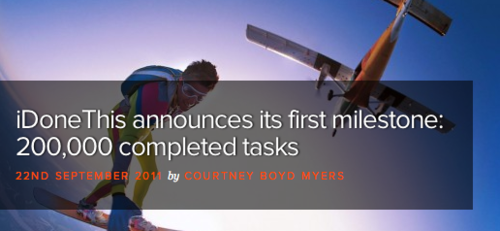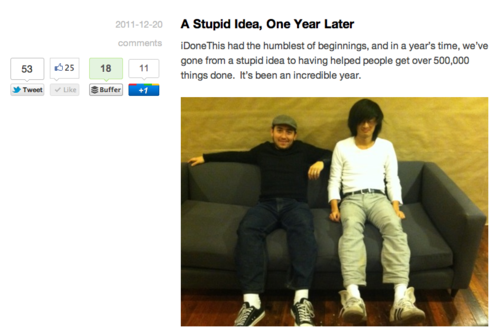Every milestone is an opportunity to attract attention to your startup because you have a piece of “news” — a new piece of noteworthy information that no one else but you has.
When you have something to announce, conventional wisdom says to go to the press and blogs with your story because they (1) have distribution and (2) are expert in crafting a story. In the past, we’ve offered nuggets of news to journalists as exclusives, and we’ve gotten written up by Betabeat and The Next Web this way.
However, we’ve recently experimented with writing our own story on our own blog, telling a narrative that’s personal and shows how we work behind the scenes, harnessing the power of social news for distribution — and that has resulted in our all-time one-day high for traffic and 1,000+ signups, more than double the signups resulting from our press coverage. Through that experience, we’ve learned the importance of writing your own story and turning transparency and narrative into a competitive advantage.
The Old Way

Here’s the short email I sent to Courtney Boyd Myers at The Next Web when we passed 200,000 daily dones. She had written about us once before, and we had a great experience with that early press coverage.
Hey Courtney, we’ve crossed a significant milestone here at iDoneThis and I wanted to give you an exclusive on it because you kicked things off for us with your article back in January.
Our users have gotten 200,000 things done using iDoneThis.
I’d love to talk with you about what people have gotten done. One person used iDoneThis to finish his Ph.D. My co-founder used iDoneThis to go from the couch to finishing Tough Mudder. Another guy even used iDoneThis to propose to his girlfriend.
Let me know if you’re interested in writing about us!
She agreed and asked me some questions, and a few days later, we had a story: iDoneThis announces its first milestone: 200,000 completed tasks.
We got 400+ signups from the article, some traffic, social media buzz, and pats on the back from friends.
Writing Our Own Story
When we hit 500,000 daily dones, we decided to do something a little different. In addition to getting press coverage about how we hit 500,000 daily dones, we wrote our own story on our blog that gave a behind-the-scenes look on the year leading up to hitting our big milestone.

The Next Web story got around 1,000 people to click through, producing over 400 signups. Our blog post got 3,000+ people to click through, resulting in just over 1,000 signups.
Lacking a distribution network for our post, we turned to Hacker News. Social news sites like Hacker News are a democratic force, giving everyone an equal say, 1 upvote, in determining the placement of an article.
That’s not to say that social news is a meritocracy. Most people I know who have turned getting to the top of HN into a repeatable process use an email list to request upvotes whenever they post a piece in order to get the requisite momentum to reach the top. Nevertheless, HN is still one person, one vote, instead of one person positioned as a gatekeeper, as in the press. Plus, quality is a big determinant in an article’s staying power once it’s placed near the top of the main page.
Press is obviously press-centric, curated by editors, whereas social news is centered around the individual reader. When you get press coverage, you build a relationship with the press — for instance, getting to know the journalist who wrote about you — and you’re more likely to get written up by that journalist and publication again.
When you write your own story, you build a relationship with the readers themselves. They follow you on Twitter and “like” you on Facebook, creating subscriptions, essentially. Through these channels, you can reach them again, leveraging your HN email list into a Twitter and Facebook following or, put differently, your own distribution network.
Both create a repeatable process for driving traffic to your site, but the latter is more reliable and the content it demands is more personal and, I think, compelling. Ultimately, “news” most often refers to funding announcements, new feature releases and the like — not, for instance, a description about the clever way that you solved an interesting problem. Writing your own story is your opportunity to establish your MVP (Minimum Viable Personality), show the world who you are, and make that your competitive advantage.
